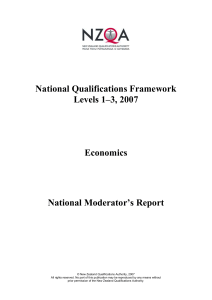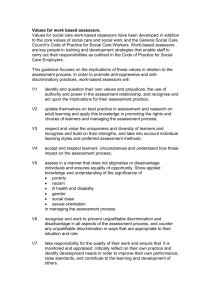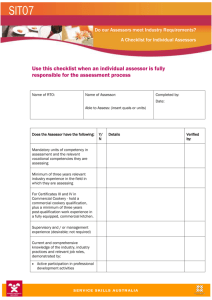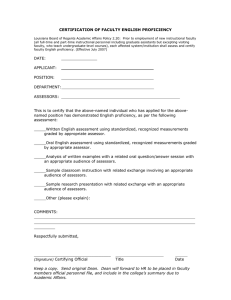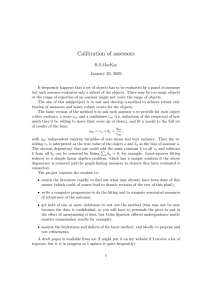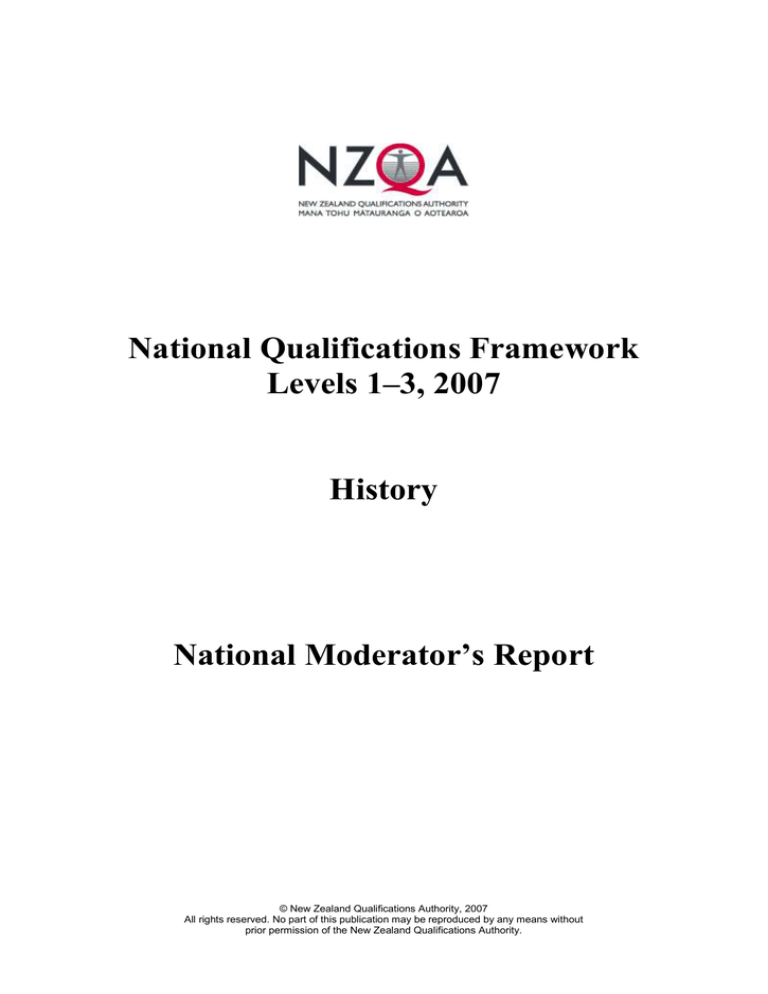
National Qualifications Framework
Levels 1–3, 2007
History
National Moderator’s Report
© New Zealand Qualifications Authority, 2007
All rights reserved. No part of this publication may be reproduced by any means without
prior permission of the New Zealand Qualifications Authority.
National Qualifications Framework Levels 1–3 (History) 2007 — page 2
NATIONAL MODERATOR REPORT FOR HISTORY
General Guidance for Assessors of Achievement and Unit Standards
The purpose of external moderation is to provide reassurance that assessor
judgments are at the national standard and are made on the basis of assessment
materials that are fair and valid.
All assessment materials are expected to:
•
give the learner the opportunity to meet the requirements of the standard
•
have an assessment schedule that gives evidence of appropriate learner responses
and clear judgments at all levels.
The Ministry of Education contracted subject experts to write assessment resources for
achievement standards. These are not pre-moderated. The intention is that they are
modified to suit teaching programmes and learner needs. They do not provide “rules”
but suggest different ways of assessing to the nationally registered standard.
General Overall Comment
The moderation of internally assessed achievement standards and unit standards in
History continues to be an effective way of promoting national consistency of
assessment materials and assessor judgements.
Most assessors continue to use assessment materials from the TKI website, although
some are still not making the necessary modifications, such as adding specific
assessment conditions and contextualizing assessment schedules where appropriate. An
increasing number of schools are writing their own assessment activities and the best
examples are those which follow closely the format of the TKI website samples. Where
original activities are used, assessment materials issued to learners must make clear the
criteria requirements of the higher performance levels of Achievement with Merit and
Achievement with Excellence. These requirements should be included in the activity
instructions, in preference to simply giving learners a copy of the standard.
There continues to be a major problem with assessment materials, especially where
some commercial activities are used, not reflecting the requirements of the current
version of the registered standard. Assessors are reminded that both the activity
instructions and the assessment schedule must match the criteria of the current version
of the standard to enable accurate assessor judgements to be made and to avoid
confusion for learners. Careful checking of all assessment materials against current
standards, before these materials are used with learners, is strongly recommended.
On some occasions, moderators have noted the use of unaltered task sheets, which have
obviously been designed for pre-NCEA assessment purposes. These need to be altered
to reflect the requirements of the achievement criteria of the standard being assessed
against.
As was stated in last year’s report, assessors are urged to refer to the most up to date
versions of the TKI website activities as these have been updated to reflect the current
versions of the standards and in response to moderation experience.
National Qualifications Framework Levels 1–3 (History) 2007 — page 3
When developing their own materials for achievement or unit standards assessments,
assessors are again reminded that assessment schedules must include examples of
learner responses that suit the context of the activity. These should also clearly reflect
differences in performance levels of Achievement, Achievement with Merit and
Achievement with Excellence where there is a gradation for a particular criterion. Some
assessors are still not submitting assessment schedules for moderation purposes even
though this is a requirement of the moderation system. The standard itself, or a
summary information sheet issued to learners, does not constitute an assessment
schedule to enable accurate assessor judgements to be made.
Careful consideration of the explanatory notes of standards is recommended when
making judgements of learners’ work, especially for the higher performance levels.
Some assessors continue to make inflated judgements at these levels, which are not
consistent with the national standard.
AS 90209: Carry our an historical investigation
This standard continues to cause little concern. Assessors need to be reminded again,
however, that learners can meet the requirements of the fifth evaluation criterion in a
variety of ways; some assessors are still restricting the way learners approach this
criterion by requiring them to just comment on the relevance of selected evidence to the
focusing questions. Explanatory Note 5 of the standard gives guidance on the scope of
possible evaluative comments.
AS 90210: Communicate historical ideas
There has continued to be a marked improvement in consistency of judgements with
this standard, although assessors are again reminded that both criteria of the standard
should be given equal weighting when making assessor judgements. Some assessors
are still tending to base judgements mainly on the second criterion format and/or style
requirements and are ignoring the intent of the first criterion to Identify relevant key
ideas.
AS 90465: Plan and carry out an historical inquiry
This standard is generally well understood and moderators noted again that most
judgements were consistently at the national standard.
Some assessors, however, do not seem to have recognized that for the current version of
the standard there is a clear differential across the performance levels for the second
criterion Plan the inquiry and that there are clear expectations of more detail for
Achievement with Merit and Achievement with Excellence. In some cases this second
criterion requirement has been ignored completely even though this is clearly indicated
in the standard’s title, Plan and carry out an historical inquiry.
Assessors are also reminded that a research diary or log of activities carried out during
the inquiry process does not constitute a plan as required by the standard. Explanatory
Note 5 clarifies the intent of the second criterion for assessors.
AS 90466: Communicate historical ideas to demonstrate understanding of an
historical context
National Qualifications Framework Levels 1–3 (History) 2007 — page 4
As was the case with 90210, some moderators have noted that the main issue with this
standard is where assessors are putting too much emphasis on format and/or style
requirements and have struggled to grasp the intent of the first criterion, which is
clarified in Explanatory Notes 3 and 4.
As has been mentioned in previous reports, learners would benefit from direct
instruction on what constitute key historical ideas and how these can be communicated
clearly within the mode of communication, other than an essay, which is being used.
AS 90468: Examine perspectives and responses of, and demonstrate empathy for,
people in an historical setting
Assessors continue to have a very good understanding of this standard and are using a
variety of interesting and original assessment activities.
On occasions, some assessors have missed the intent of the first criterion to describe
and explain responses of people in addition to the more obvious perspectives.
Explanatory Note 6 lists the ways by which responses could be conveyed by learners.
AS 90654: Plan and carry out independent historical research
Most assessors are now offering valid assessments and making accurate judgements of
this standard.
The main concerns, however, where noted by moderators, involve the first and second
criteria. Assessors are reminded that to meet the requirements of the higher performance
levels of Achievement with Merit and Achievement with Excellence, learners must
devise more sophisticated focusing questions than those required to gain Achievement.
Learners should also be made aware of Explanatory Notes 5 and 6 to help clarify this
distinction.
For the second Plan the research criterion learners must provide a sufficient amount of
detail in line with Level 3 expectations. As was the case with 90465, a research diary, or
log of activities carried out during the research process, does not constitute Planning the
research as clarified in Explanatory Note 7.
Assessors are again reminded that to reach the Achievement with Excellence
performance level for the fifth evaluation criterion, the areas indicated in Explanatory
Note 13 must be covered, in addition to the requirements of Explanatory Note 12.
AS 90655: Communicate and present historical ideas clearly to show understanding
of an historical context
While more assessors now have a better understanding of the intent of this standard,
there is still a need for careful consideration and unpacking of the elements of the first
criterion so that these can be made transparent to learners. It is evident that the best
learner work and most accurate assessor judgements occur when learners are given clear
directions, including examples, on what constitute key historical ideas and how these
can be communicated explicitly, with accurate supporting evidence in a particular mode
National Qualifications Framework Levels 1–3 (History) 2007 — page 5
of presentation other than an essay. Explanatory Notes 3,4 and 5 need to be referred to
for guidance when assessing against this standard.
Unit Standards
There was an increasing number of unit standards submitted for moderation. Many of
these were at Level 3 as an alternative to the externally assessed achievement standards.
Most assessors using them had few difficulties, although it was noted that in some cases
activity instructions did not make clear to learners the requirements of all performance
criteria.

